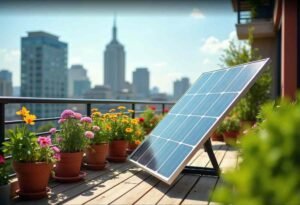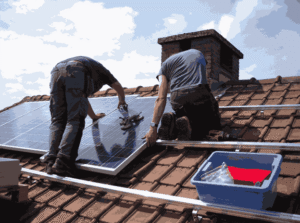Solar energy has become one of the most popular renewable energy sources in recent years. With rising electricity costs and growing concerns about environmental sustainability, many homeowners and businesses are turning to solar power. But is it really worth the investment? Understanding the cost-benefit of solar energy investments can help you make an informed decision.
This guide will break down the costs, benefits, and long-term savings associated with solar energy, making it easy for you to decide whether going solar is right for you.
The Initial Costs of Solar Energy
Before you install a solar energy system, it’s important to understand the costs involved. Here are the main expenses:
Solar Panels
Solar panels come in different types, including monocrystalline, polycrystalline, and thin film. Prices vary based on efficiency and durability, but generally, the cost per watt ranges between $2.50 and $3.50.
The number of panels you need depends on your household energy consumption and available roof space. Higher-efficiency panels may cost more upfront but can provide better long-term savings.
Inverter System
An inverter converts the direct current (DC) electricity generated by the panels into alternating current (AC) that can power your home. Inverter costs typically range from $1,000 to $3,000, depending on the type and capacity. Modern inverters come with monitoring systems that allow you to track your energy production and consumption.
Installation and Labor
Professional installation is essential for safety and efficiency. Installation costs depend on system size and complexity but usually range from $5,000 to $10,000. A certified solar installer ensures compliance with local regulations and optimal panel placement for maximum energy generation.
Permits and Inspections
Local governments require permits and inspections for solar installations. Fees can range from $500 to $2,000, depending on location and system size. These permits ensure that the installation meets safety and building codes, preventing future complications.
Battery Storage (Optional)
If you want to store energy for use at night or during power outages, you may need a battery storage system, which can cost between $5,000 and $15,000. Batteries like Tesla Powerwall, LG Chem, and Sonnen offer high-capacity storage and allow you to maximize self-consumption of solar energy.
The Financial Benefits of Solar Energy
While the upfront cost of solar energy can seem high, there are many financial benefits that make it a worthwhile investment.
Reduced Energy Bills
One of the biggest advantages of solar energy is lower electricity bills. Once your system is installed, it can generate free power from the sun, significantly reducing or even eliminating your monthly electricity costs. Depending on energy usage and system size, savings can range from $500 to $2,000 per year.
Government Incentives and Tax Credits
Many governments offer tax credits and rebates for solar installations. In the U.S., the federal solar tax credit allows homeowners to deduct a percentage of their solar system costs from their taxes. Additional state and local incentives can further reduce costs, making solar power more affordable.
Net Metering Benefits
Net metering programs allow homeowners to sell excess energy back to the grid. This means that when your solar panels generate more electricity than you use, you can earn credits on your utility bill. Some states and utility companies offer higher buyback rates, maximizing your financial return.
Increased Home Value
Homes with solar panels often sell for more than those without. A study by the National Renewable Energy Laboratory (NREL) found that homes with solar panels sell 20% faster and for 17% more money. Buyers appreciate the long-term savings and sustainability benefits of a solar-powered home.
Long-Term Savings
Over time, solar panels can provide significant savings. Most systems pay for themselves within 6 to 10 years, and since panels typically last 25 to 30 years, you can enjoy decades of reduced energy costs. With electricity rates continuing to rise, solar energy provides a hedge against inflation.
Factors Affecting Solar Investment Returns
Several factors influence the return on investment (ROI) of a solar energy system.
Location and Sunlight Exposure
Regions with more sunlight generate more solar power. If you live in a sunny area, your system will produce more energy and provide higher savings. States like California, Arizona, and Florida offer ideal conditions for solar energy investments.
Energy Consumption
If your household or business consumes a lot of energy, solar power can lead to greater savings. However, lower consumption may mean a longer payback period. Evaluating past electricity bills can help determine the best system size for your needs.
System Size and Efficiency
A properly sized system is crucial. An oversized system may produce more energy than you need, while an undersized system may not provide enough savings. Professional installers use energy audits to determine the optimal system size for your home.
Maintenance and Longevity
Solar panels need little maintenance. However, cleaning them now and then, along with system checkups, helps keep them running well. Most panels have warranties of 20-25 years, ensuring long-term reliability. Regular inspections help detect issues early and maintain efficiency.
Local Electricity Rates
If electricity rates in your area are high, switching to solar can result in greater savings over time. Areas with frequent rate hikes benefit the most from solar energy investments.
How to Maximize Your Solar Investment
To get the best value from your solar energy investment, follow these steps:
Utilize Professional Solar Companies
Working with a reputable solar company ensures quality installation and efficient system performance. Find a professional solar company to help you choose the best system for your needs and navigate available incentives.
Take Advantage of Incentives
Look into government incentives. Then apply for tax credits and rebates. This can help lower your upfront costs. Some programs offer grants or low-interest financing for solar installations.
Consider Battery Storage
If you often have power outages or want to be more self-sufficient, a battery storage system can store extra energy. This way, you can use it later and rely less on the grid.
Monitor Your System
Many solar energy systems include monitoring software. This software helps you track energy production and consumption, so you can ensure optimal efficiency.
Perform Regular Maintenance
Solar panels need little maintenance, but keeping them clean helps. It also ensures the system works well, boosting performance and lifespan.
Is Solar Energy Worth the Investment?
Investing in solar energy offers significant financial and environmental benefits. If you’re considering going solar, take the time to research costs, benefits, and available incentives. To ensure a smooth installation and maximum savings, be sure to find a professional solar company to guide you through the process.
Still unsure where to begin? Our site has all the answers you’re looking for. Click through to learn more today!







